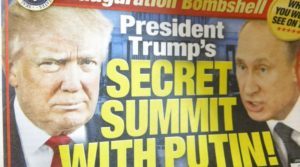Empire Spymongering and Elite Conspiracy Practitioners

Note to readers: please click the share buttons above
The mass media and political leaders of the US have resorted to denouncing competitors and adversaries as spies engaged in criminal theft of vital political, economic and military know-how.
The spy-mania has spread every place and all the time, it has become an essential element in driving national criminal hearings, global economic warfare and military budgets.
In this paper we will analyze and discuss the use and abuse of spy-mongering by (1) identifying the accused countries which are targeted; (2) the instruments of the spy conspiracy; (3) the purpose of the ‘spy attacks’.
Spies, Spies Everywhere: A Multi-Purpose Strategy
Washington’s ‘spy-strategy’ resorts to multiple targets, focusing on different sectors of activities.
Russia has been accused of poisoning adversaries, using overseas operatives in England. The evidence is non-existent. The accusation revolves around an instant lethal poison which in fact did not lead to death.
No Russian operative was identified. The only ‘evidence’ was that Russia possessed the poison- as did the US and other countries. The events took place in England and the British government played a major role in pointing the finger toward Russia and in launching a global media campaign which was amplified in the US and in the EU.
The UK expelled Russian diplomats and threatened sanctions. The Trump regime picked up the cudgels, increasing economic sanctions and demanding that Russia ‘confess’ to its ‘homicidal behavior’. The poison plot resonated with the Democratic Party campaign against Trump , accusing Russia of meddling in the Presidential election, on Trump’s behalf. No evidence was presented. But the less the evidence, the longer the investigation and the wider the conspiratorial net; it now includes overseas business people, students and diplomats.
US conspiracy officials targeted China, accusing the Chinese government of stealing US technology, scientific research and patents. China’s billion dollar “Belt and Road” agreement with over sixty countries was presented as a communist plot to dominate countries, grab their resources, generate debt dependency and to recruit overseas networks of covert operatives. In fact, China’s plans were public, accepted by most of the US allies and …membership was even offered to the US.
Iran was accused of plotting to establish overseas terrorist military operations in Yemen, Iraq and Syria – targeting the US, Israel and Saudi Arabia. No evidence was ever presented. In fact, massive US and EU supplied arms and advisors to Saudi Arabia’s overt terror bombing of Houthi-led Yemen cities and populations. Iran backed the Syrian government in opposition to the US backed armed mercenaries. Iranian advisers in Syria were bombed by Israel – and never retaliated.
The US policy elite resort to conspiratorial plots and spying depends heavily on the mass media to repeat and elaborate on the charges endlessly, depending on self-identified experts and ex-pats from the targeted country. In effect the media is the message. Media-state collaboration is reinforced by the application of sanctions— the punishment proves guilt!
In the case of Russia, the conspirators demonize President Putin; he is ‘guilty’ because he was an ex-official of the police; he was accused of ‘seizing’ Crimea which voted to rejoin Russia. In other words, plots are linked to unrelated activity, personality disorders and to US self-inflicted defeats!
Labeling is another tool common to conspiracy plotters; China is a ‘dictatorship’ intent on taking over the world— therefore, it could only defeat the US through spying and stealing secrets and assets from the US.
Iran is labelled a ‘terrorist state’ which allows the US to violate the international nuclear agreement and to support Israeli demands for economic sanctions. No evidence is ever presented that Iran invaded or terrorized any state.
The Political Strategy Behind Conspiracy Terrorists
There are several important motives for the US government to resort to conspiracy plots.
By accusing countries of crimes, it hopes that the accused will respond by revealing their inability or unwillingness to engage in the action falsely attributed to them. Pentagon plots put adversaries on the defensive – spending time and energy answering to the US agenda rather than pursuing and advancing their own.
For example, the US claims that China is stealing economic technology to promote its superiority, is designed to pressure China to downplay or modify its long-term plan for strategic growth. While China will not give general credence to US conspiracy practitioners, it has downplayed the slogans designed to motivate its scientists to “Make China Great’.
Likewise, the US conspiracy practitioners accusation that Iran is ‘meddling’ in Yemen and Syria is designed to distract world opinion from the US military support for Saudi Arabia’s terror bombing in Yemen and Israel’s missile attacks in Syria.
Plot accusations have had some effect in Syria. Russia has demanded or asked Iran to withdraw fifty miles from the Israeli border. Apparently Iran has lowered its support for Yemen.
Russia has been blanketed with unsubstantiated accusations of intervening in the Ukraine, which distracts attention from Washington’s support for the mob-led coup.
The UK claim that Russia planted a deadly poison, was concocted in order to distract attention from the Brexit fiasco and Prime Minister May’s effort to entice the US to sign a major trade agreement.
How Successful are Conspiratorial Politics?
The greatest success of the US conspiracy practitioners has been in convincing the US mass media to act as an arm of the CIA-Pentagon-Congressional and Presidential interventionist agenda.
Secondly, the conspiracy has had an impact on both political parties – especially the Democratic leadership, which has waged a political war accusing Trump of plotting with Russia, to defeat Clinton in the presidential elections. However, Democratic conspiracy advocates have sacrificed their popular electorate who are more interested in economic issues then in regime plots – and may lose to the Republicans in the fall 2018 Congressional elections.
Thirdly, the plot and spy line has some impact on the EU but not on their public. Moreover, the EU is more concerned with President Trump’s trade war and made overtures to Russia.
Fourthly, China , Iran and Russia have moved closer economically in response to the conspiracy plots and trade wars.
Conclusion: The Perils of Power Grabbers
Conspiratorial plots have a narrow audience, mostly the US mass media and elite . They seem to have a short-term impact in justifying sanctions and trade wars. The media plotters having called wolf and proved nothing ,have lost credibility among a wide swath of the public.
Moreover, the conspiracy has not resulted in any basic shifts in the orientation of their adversaries, nor has it shaped the electoral agenda for the majority of US voters.
The conspiracy advocates have discredited themselves by the transparency of their fabrications and the flimsiness of their evidence. In the long-run, historians will provide a footnote on the bankruptcy of US foreign and domestic policy based on plots and conspiracies.
*
Award winning author Prof. James Petras is a Research Associate of the Centre for Research on Globalization.


